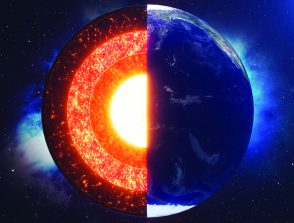From mantle dynamics to atmosphere generation: the crucial role of early (exo)planetary evolution
20/03/2024
IPGP - Îlot Cuvier
14:00
Séminaires thème Intérieurs de la Terre et des planètes
Salle 310
Maxime Maurice
Institut Pierre-Simon Laplace
The early stages of the evolution of terrestrial bodies, directly following their differentiation from a deep magma ocean, bear a great influence on the long-term evolution of both their interiors and atmospheres. The primordial magma ocean induces significant outgassing of volatile elements from the mantle and the creation of an atmosphere, whose composition is largely controlled by that of the planet. Whether this atmosphere is retained or escapes to space depends on its composition as well as the energy flux received from the host star, and it strongly affects the planetary volatile budget. The crystallization of the magma ocean leads to further outgassing, controlled by the efficiency of convective mixing. In turn, the convective cooling flux of the magma ocean is influenced by the greenhouse effect of the atmosphere. In this presentation, I will show the diversity of possible magma ocean-outgassed atmospheres on rocky planets and exoplanets, and their consequences on the cooling path of the mantle and its inherited volatile content. I will also present results on atmosphere retention, and use the obtained atmospheric compositions to make predictions regarding exoplanets observations. From the crystallization of the magma ocean, the solid mantle inherits a specific thermal and compositional structure that provides the initial condition for its long-term interior evolution. On the long term, chemical reservoirs can thus be isolated in the deep mantle, or on the contrary, be well mixed in the bulk mantle. Trace elements like volatiles can hence be either scavenged or made available to interior-exterior exchanges like volcanism. Based on the examples of Mars and the Moon, I will then introduce the dynamical interplay between magma ocean crystallization and the onset and development of solid mantle dynamics, in order to highlight the role of this inherited structure on the planets long-term evolution. In particular, I will show that coeval onset of solid mantle convection and magma ocean crystallization challenges the paradigm of mantle overturn and its consequences on these two bodies. I will finally explore the avenues of using this model to study long-term interior- exterior exchanges of volatile elements, and rocky exoplanets atmosphere evolution. Understanding these processes is crucial: beyond their obvious astrobiological interest when applied to life-essential elements, they play essential roles in setting cosmochemical tracers (like noble gases or geo-chronometer isotopes) that help us understand the history and origin of the elements and building blocks in the solar system. Last but not least, their understanding is key in predicting the composition of rocky exoplanetary atmospheres that we are just starting to have the capacity to characterize.




